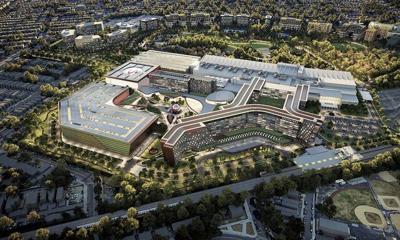NEW YORK (AP) — A Caesars Palace casino in the heart of Times Square. A sprawling gambling hall along Coney Island’s iconic boardwalk. A Hard Rock casino complex next to the home stadium of baseball’s New York Mets.
Eight projects are bidding for a state license to operate a casino in the lucrative New York City market, each dangling the prospect of generational investment in America’s largest metropolitan region.
But one — a Bally's casino proposed on a Bronx golf course once — may have already run out of luck, after city lawmakers denied it a key approval this week.
All of the proposed casinos, in submitted in recent days, promise to create thousands of new jobs, flashy new community amenities in the form of hotels, shops, restaurants and entertainment venues and billions of dollars a year in taxable gambling revenues for the state’s coffers.
How realistic those promises are, though, is an open question, given the and the explosion of online gambling in recent years, casino experts say.
Gambling industry spending big, but some locals aren't sold
The arrival of full-fledged casino resorts in New York City has been years in the making.
The gambling industry spent mightily to secure approval from New York voters in a referendum authorizing the licensing of up to seven full casinos with live table games back in 2013. But the state initially allowed upstate venues a head start.
The state's Gaming Commission says it hopes to finally award up to three downstate licenses in December. But before then, community advisory committees appointed by lawmakers and local officials will weigh community opinions of each plan.
Nearly all the casino proposals face some degree of local push back.
On Monday, the New York City Council denied Bally's a needed rezoning change following local resident concerns about the environmental impact of its $4 billion proposal, which also calls for a 500-room hotel and a 2,000-seat event center.
Bally’s, which bought the former Trump Links course in 2023, to pay Trump another $115 million if it were to secure a casino license, though that was not among the objections voiced by the Democratic majority on the council nor the Republican lawmaker representing the Bronx district. Spokespersons for Bally’s declined to comment on the future of the project this week.
Not surprisingly, the debate over the proposed Times Square casino has taken center stage, with supporters and opponents recently holding dueling rallies in the Crossroads of the World.
Among the prominent groups opposed to the $5.4 billion plan is the Broadway League, a trade group representing America’s performing arts theaters. It says a casino would draw patrons away from neighborhood businesses and threaten a theater industry still reeling from the COVID-19 pandemic.
The project's backers have countered that the plan, which calls for renovating a skyscraper that currently houses the Minskoff Theatre, home of long-running “The Lion King” musical, will actually boost demand for Broadway tickets.
The developers, which have also enlisted Jay-Z’s Roc Nation to curate their entertainment offerings, promise $250 million in community projects, including a public safety plan designed by former NYPD Commissioner Bill Bratton and a multimillion-dollar civil rights museum that helped earn an endorsement from the Rev. Al Sharpton.
The two other casinos proposed in Manhattan — one for its West Side and another on its East Side — could face similar headwinds, given their proximity to residential neighborhoods, according to casino experts.
But the proposed West Side resort, near the Jacob K. Javits Convention Center and the Lincoln Tunnel to New Jersey, could reel in business travelers and convention attendees, if it can win over locals, said Soojin Ha, a lecturer at Cornell University’s business school.
Meanwhile in Brooklyn, organizers of the are among those leading the charge against a Coney Island casino, arguing the plan would remove large chunks of the boardwalk’s iconic amusement rides and block access to the public beach.
New York market could support 3 casinos, expert says
Since the 2013 referendum, have opened in New York, though all of them are located upstate, miles away from Manhattan. The state also has offering slot machines and other electronic gambling machines but no live table games.
Some three hours drive north of Manhattan are the Native American tribe-owned Mohegan Sun and Foxwoods casinos in Connecticut. Two hours south are the New Jersey shore casinos of Atlantic City, and less than two hours due west in Pennsylvania is the tribe-owned Wind Creek Casino at the former site of Bethlehem Steel.
Despite the competition from seemingly all corners, New York City’s dense market could sustain three gambling halls, depending on where they’re located, suggests John Holden, a business professor at Indiana University who specializes in gambling law.
“We typically see fairly rosy revenue projections put out by the gaming industry, but the New York City market is really without comparison,” he said.
The state could hedge its bets by awarding two of the three licenses to proven winners: the racinos -- slot parlors built alongside horse racing tracks — that have been successfully operating for years in the New York City area, said Alan Woinski, a New Jersey-based gambling consultant.
MGM Resorts is proposing a $2.3 billion expansion of the Empire City Casino at Yonkers Raceway. Resorts World, owned by Malaysian casino giant Genting, is proposing a $5.5 billion investment to its gaming facility at the Aqueduct Racetrack in Queens.
Those expansions, Woinski noted, could be rolled out in a matter of months, meaning the state wouldn’t have to wait years for the construction of a wholly new site to start reaping the financial windfall.
___
Follow Philip Marcelo at

